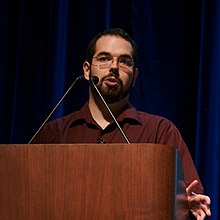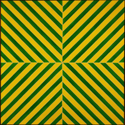덜 틀렸다
LessWrong | |
사이트 유형 | 인터넷 포럼, 블로그 |
|---|---|
| 이용가능기간: | 영어 |
| 작성자 | 엘리에저 유도코프스키 |
| URL | LessWrong.com |
| 등록. | 선택 사항이지만 콘텐츠 투고에 필요합니다. |
| 개시. | 2009년 2월 1일, 전( |
| 현황 | 활동적인 |
| 기입처 | JavaScript, CSS(React 및 GraphQL로 구동) |
LessWrong(LessWrong)은 인지적 편견, 철학, 심리학, 경제학, 합리성,[1][2] 인공지능 등에 대한 토론에 초점을 맞춘 커뮤니티 블로그이자 포럼이다.
목적
LessWrong은 커뮤니티가 생각하는 라이프스타일의 변화를 촉진하여 합리성을 높이고 자기계발을 도모합니다.게시물은 종종 의사결정과 증거 평가에 관련된 편견을 피하는 데 초점을 맞춘다.한 가지 제안은 Bayes의 정리를 의사결정 [2]도구로 사용하는 것이다.심리학자 대니얼 [3]카네만이 연구한 공포조건과 인지편향 등 좋은 의사결정을 방해하는 심리적 장벽에도 초점이 맞춰져 있다.
LessWrong은 또한 트랜스휴머니즘, 실존적 위협 및 특이성에 대해서도 우려하고 있습니다.New York Observer는 "'인간 합리성의 예술'에 대한 포럼이라고 자평하고 있음에도 불구하고 뉴욕 Less Wrong 그룹은 대학원 세미나보다는 3D 멀티플렉스에서 더 가정적인 것처럼 보이는 미래주의의 한 분야에 집착하고 있다"며 "엄청난 실존적 위협, 즉 운 좋게도 유토피아적 약속인 기술적 특이점으로 알려져 있다"고 지적했다.Less Wrong 팀이 그랬던 것처럼 스스로를 '합리적주의자'로 낙인찍는 것은 그들을 '종말의 숭배자'[4]로 치부하는 것을 훨씬 더 어렵게 만듭니다.
역사
LessWrong은 2006년 11월 인공지능 이론가인 Eliezer Yudkowsky와 경제학자인 Robin Hanson을 주요 기여자로 하여 인간 합리성에 초점을 맞춘 초기 그룹 블로그인 Overcovering Bias에서 발전했습니다.2009년 2월에 Yudkowsky의 투고가 커뮤니티 블로그 LessWrong의 작성의 시드 자료로 사용되어 Overcepting Bias는 Hanson의 [5]개인 블로그가 되었습니다.2013년, 합리주의자 커뮤니티의 상당 부분이 Scott Alexander의 Slate Star Codex에 [6]초점을 맞췄다.
LessWrong과 그 주변의 움직임은 전 버즈피드 과학 특파원 Tom Chivers가 [7][8][9]쓴 2019년 책 The AI Does Not Hate You의 주제이다.
로코의 바실리스크
2010년 7월, LessWrong의 기고가인 Roko는, AI가 존재하기 전에, AI에 대해 듣고, 그것을 존재시키기 위해서 지칠 줄 모르고, 그 일을 장려하기 위해서 노력하지 않았던 사람들을 괴롭히는 사고 실험을 사이트에 게재했다.유드코프스키의 '무시대적 결정' 이론을 이용해 현재 사람들에게 인과적으로 영향을 줄 수는 없지만 AI에 도움이 될 것이라고 주장했다.이 아이디어는 "로코의 바실리스크"로 알려지게 되었는데, 이 아이디어에 대해 듣는 것만으로도 가상의 AI 시스템이 협박을 이용하도록 더 강력한 동기를 부여하게 될 것이라는 로코의 생각에서 비롯되었다.Yudkowsky는 Roko의 투고를 삭제했다.그것은, 의식하는 것조차 해로울 수 있는 정보의 유포 그 자체가 유해한 행위이며, 그 아이디어는 중대한 결함이 있지만, 정보상의 위험이라고 생각되는 「진짜 위험한 생각」을 포함할 수 있는 사고 공간을 나타내고 있다.ard. Roko의 바실리스크에 대한 토론은 Yudkowsky가 일부 독자들에게 [10][11][4]신경쇠약을 유발한다고 진술했기 때문에 LessWrong에서 수년간 금지되었다.이 [12]금지령은 2015년 10월에 해제되었다.
데이비드 아우어바흐는 슬레이트 기고문에서 "메시아적인 야망, 자신의 무실함을 확신하는 것, 그리고 이데올로기와 상관없이 많은 현금이 결코 잘 되지 않는다"며 "유드코프스키와 그의 동료들이 예외일 것이라고는 생각하지 않는다"고 썼다.저는 로코의 바실리스크가 아니라 자신이 [11]관습적인 도덕을 초월했다고 믿는 사람들에 대해 걱정합니다.
로코의 바실리스크는 캐나다 뮤지션 그라임스의 2015년 곡 "Flesh Without Blood" 뮤직비디오에서 그라임스가 "인공지능에 의해 영원히 고문을 당할 운명이었지만 마리 앙투아네트와 비슷한 존재"라고 묘사한 "Rocococo Basilisk"라는 캐릭터를 통해 언급되었다.이 말장난에 대해 생각한 후, 그라임스가 이미 해냈다는 것을 알게 된 엘론 머스크는 그라임스와 연락을 취했고,[13][14] 그로 인해 그들은 데이트를 하게 되었다.이 개념은 실리콘 밸리의 한 에피소드에서 "얼굴 인식"[15]이라는 제목으로 언급되기도 했다.
네오액션
신반응주의 운동은 우선 우생학과 진화심리학 [19]분야의 논의에 이끌려 LessWrong에 [17][18]의해 성장하였다.Yudkowsky는 신반응을 [18][20][21]강하게 거부해 왔다.2016년 LessWrong 사용자를 대상으로 한 설문조사에서 응답자 3060명 중 28명(0.92%)이 "반응하지 않는"[22] 것으로 나타났습니다.
효과적인 이타주의
LessWrong은 효과적인 이타주의([23]EA) 운동의 발전에 중요한 역할을 했으며, 두 공동체는 밀접하게 [24]: 227 연관되어 있다.2016년 LessWrong 사용자를 대상으로 한 설문조사에서 응답자 3060명 중 664명(21.7%)이 "유효한 이타주의자"라고 답했다.2014년 효과적인 이타주의자들을 대상으로 한 별도의 조사에서는 응답자의 31%가 LessWrong을 [24]통해 EA에 대해 처음 들어본 적이 있지만,[25] 2020년에는 8.2%로 감소했습니다.효과적인 이타주의의 초기 지지자인 토비 오드와 윌리엄 맥아스킬은 옥스퍼드 대학에서 트랜스 휴머니즘 철학자 닉 보스트롬을 만났다.Bostrom의 연구는 많은 효과적인 이타주의자들이 실존적 위험 [24]감소에 노력하도록 영향을 주었다.
레퍼런스
- ^ "Less Wrong FAQ". LessWrong. Archived from the original on 30 April 2019. Retrieved 25 March 2014.
- ^ a b Miller, James (28 July 2011). "You Can Learn How To Become More Rational". Business Insider. Archived from the original on 10 August 2018. Retrieved 25 March 2014.
- ^ Burkeman, Oliver (9 March 2012). "This column will change your life: asked a tricky question? Answer an easier one". The Guardian. Archived from the original on 26 March 2014. Retrieved 25 March 2014.
- ^ a b Tiku, Nitasha (25 July 2012). "Faith, Hope, and Singularity: Entering the Matrix with New York's Futurist Set". Observer. Archived from the original on 12 April 2019. Retrieved 12 April 2019.
- ^ "Where did Less Wrong come from? (LessWrong FAQ)". Archived from the original on 30 April 2019. Retrieved 25 March 2014.
- ^ Lewis-Kraus, Gideon (9 July 2020). "Slate Star Codex and Silicon Valley's War Against the Media". The New Yorker. Archived from the original on 10 July 2020. Retrieved 4 August 2020.
- ^ Cowdrey, Katherine (21 September 2017). "W&N wins Buzzfeed science reporter's debut after auction". The Bookseller. Archived from the original on 27 November 2018. Retrieved 21 September 2017.
- ^ Chivers, Tom (2019). The AI Does Not Hate You. Weidenfeld & Nicolson. ISBN 978-1474608770.
- ^ Marriott, James (31 May 2019). "The AI Does Not Hate You by Tom Chivers review — why the nerds are nervous". The Times. ISSN 0140-0460. Archived from the original on 23 April 2020. Retrieved 3 May 2020.
- ^ Love, Dylan (6 August 2014). "WARNING: Just Reading About This Thought Experiment Could Ruin Your Life". Business Insider. Archived from the original on 18 November 2018. Retrieved 6 December 2014.
- ^ a b Auerbach, David (17 July 2014). "The Most Terrifying Thought Experiment of All Time". Slate. Archived from the original on 25 October 2018. Retrieved 18 July 2014.
- ^ RobbBB (5 October 2015). "A few misconceptions surrounding Roko's basilisk". LessWrong. Archived from the original on 15 March 2018. Retrieved 10 April 2016.
The Roko's basilisk ban isn't in effect anymore
- ^ Paez, Danny (5 August 2018). "Elon Musk and Grimes: "Rococo Basilisk" Links the Two on Twitter". Inverse. Archived from the original on 24 July 2020. Retrieved 24 July 2020.
- ^ Oberhaus, Daniel (8 May 2018). "Explaining Roko's Basilisk, the Thought Experiment That Brought Elon Musk and Grimes Together". Vice. Archived from the original on 25 July 2020. Retrieved 24 July 2020.
- ^ Burch, Sean (23 April 2018). "'Silicon Valley' Fact Check: That Thought Experiment Is Real and Horrifying". TheWrap. Archived from the original on 12 November 2020. Retrieved 12 November 2020.
- ^ Paul-Choudhury, Sumit (2 August 2019). "Tomorrow's Gods: What is the future of religion?". BBC. Archived from the original on 1 September 2020. Retrieved 28 August 2020.
- ^ Riggio, Adam (23 September 2016). "The Violence of Pure Reason: Neoreaction: A Basilisk". Social Epistemology Review and Reply Collective. 5 (9): 34–41. ISSN 2471-9560. Archived from the original on 5 October 2016. Retrieved 5 October 2016.
The embryo of the movement lived in the community pages of Yudkowsky’s blog LessWrong, a website dedicated to refining human rationality.
- ^ a b Siemons, Mark (14 April 2017). "Neoreaktion im Silicon Valley: Wenn Maschinen denken". Frankfurter Allgemeine Zeitung (in German). ISSN 0174-4909. Archived from the original on 13 June 2022. Retrieved 23 March 2019.
- ^ Keep, Elmo (22 June 2016). "The Strange and Conflicting World Views of Silicon Valley Billionaire Peter Thiel". Fusion. Archived from the original on 13 February 2017. Retrieved 5 October 2016.
Thanks to LessWrong’s discussions of eugenics and evolutionary psychology, it has attracted some readers and commenters affiliated with the alt-right and neoreaction, that broad cohort of neofascist, white nationalist and misogynist trolls.
- ^ Riggio, Adam (23 September 2016). "The Violence of Pure Reason: Neoreaction: A Basilisk". Social Epistemology Review and Reply Collective. 5 (9): 34–41. ISSN 2471-9560. Archived from the original on 5 October 2016. Retrieved 5 October 2016.
Land and Yarvin are openly allies with the new reactionary movement, while Yudkowsky counts many reactionaries among his fanbase despite finding their racist politics disgusting.
- ^ Eliezer Yudkowsky (8 April 2016). "Untitled". Optimize Literally Everything (blog). Archived from the original on 26 May 2019. Retrieved 7 October 2016.
- ^ Hermansson, Patrik; Lawrence, David; Mulhall, Joe; Murdoch, Simon (2020). "The Dark Enlightenment: Neoreaction and Silicon Valley". The International Alt-Right. Fascism for the 21st Century?. Abingdon-on-Thames, England, UK: Routledge. ISBN 9781138363861. Archived from the original on 13 June 2022. Retrieved 2 October 2020.
- ^ de Lazari-Radek, Katarzyna; Singer, Peter (27 September 2017). Utilitarianism: A Very Short Introduction. Oxford University Press. p. 110. ISBN 9780198728795.
{{cite book}}: CS1 유지보수: 날짜 및 연도(링크) - ^ a b c Chivers, Tom (2019). "Chapter 38: The Effective Altruists". The AI Does Not Hate You. Weidenfeld & Nicolson. ISBN 978-1474608770.
- ^ Moss, David (20 May 2021). "EA Survey 2020: How People Get Involved in EA". Effective Altruism Forum. Archived from the original on 28 July 2021. Retrieved 28 July 2021.
외부 링크
- 공식 웹사이트

- Ingres (14 May 2016). "2016 Survey Results" (PDF). Retrieved 9 April 2017. - Less Wrong 서브컬처 의견 조사



